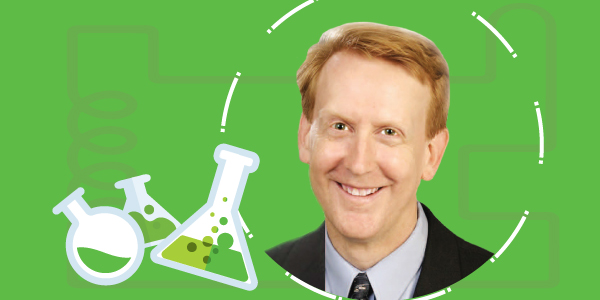Frankenstein Friday: Dr. Gunderman Scholar Essay
June 15, 2018As part of One State / One Story: Frankenstein, scholars from colleges and universities across the Hoosier state have contributed short essays on Shelley’s remarkable novel. These essays provide important…
As part of One State / One Story: Frankenstein, scholars from colleges and universities across the Hoosier state have contributed short essays on Shelley’s remarkable novel. These essays provide important contexts and insightful reflections on the implications of Shelley’s text in her own time and beyond. This week’s essay, “Frankengod” was contributed by Dr. Richard Gunderman of Indiana University Bloomington.

Read:
Essay: “Frankengod”Dr. Richard GundermanIndiana University
Mary Shelley’s Frankenstein shines a withering light on the human longing for divinity. Among the powers traditionally associated with the divine are three: to create life, to restore life, and to inspire worship. These divine prerogatives are beautifully depicted in Michelangelo’s “Creation of Adam,” the Gospel story of the raising of Lazarus, and the first Commandment, “You shall have no other gods before me.” Mere scientific and technological prowess, however, do not confer divinity. Case in point: Victor Frankenstein, who conceives of both his life mission and his ambition in god-like terms.
Marveling at the audacity of his scientific and technological quest to create life, Victor muses, “I could not consider the magnitude and complexity of my plan as any argument of its impracticality. It was with these feelings that I began the creation of a human being.” In other words, both the nature of his project – generating human life – and its extraordinary difficulty serve only to underscore the grandeur of his ambition and the unparalleled nature of his achievement, which will come to fruition at the first stirring of his new creature.
The death of Victor’s mother during his teenage years had filled him with the horror of “those whose dearest ties are rent by that most irreparable evil,” death. Realizing that “to examine the causes of life, we must first have recourse to death,” he pours himself into the study of “how the fine form of man was degraded and wasted” and “how the worm inherited the wonders of the eye and brain.” So obsessed is he with bringing the dead back to life that he must “dabble among the unhallowed damps of the grave” and “torture the living animal.”
Reflecting on the enthusiasm that bore his quest onward, Victor describes life and death as “ideal bounds, which I would first break through, and pour a torrent of light into our dark world,” with the result that “a new species would bless me as its creator and source,” “many happy and excellent natures owing their being to me.” Having birthed a new creature without the aid of a mother, “No father could claim the gratitude of his child so completely as I should deserve theirs.” The members of this new race, in other words, would worship him as their god.
Yet Victor’s yearnings for divine grandeur end in loathing and despair, and his labors to instill life virtually destroy him. He becomes “nervous to a most painful degree,” so much that “even the fall of a leaf startled me, and I shunned my fellow-creatures as if I had been guilty of a crime.” He is horrified “at the wreck I had become.” Moreover, when the creature finally stirs, it is not pride but “breathless horror and disgust” that fill his heart. Unable to endure the sight, he “rushed out of the room,” convinced that “no mortal could support the horror of that countenance.”
Frankensteinrepresents an abject lesson in the dangers of human arrogance, especially pride in our scientific knowledge and technical capabilities. In so doing, it echoes foundational texts of Western civilization. Consider the Genesis narrative of the Tower of Babel, in which human beings develop an improved means of baking bricks, which they dream of stacking high enough to storm the heavens. Or the ancient Greek myth of Prometheus, the source of Frankenstein’s alternate title, The Modern Prometheus, who gave man divine fire and was sentenced to eternal torture.
The tale of Victor Frankenstein reminds us that there is more to real divinity than mere parlor trickery. Suppose a prophet could turn water into wine, walk on water, open the eyes of the blind, or even bring the dead back to life. Would such wonders by themselves establish that a wizard deserves universal acknowledgement as a moral teacher and fit object of worship? I think not. When it comes to real divinity, there is more to a god than the ability to do what human beings regard as inherently impossible. A true god is defined less by power than by goodness.
An important source of Victor’s deadly misapprehension is his own education. At university, he falls under the influence of men “deeply imbued” with the secrets of natural science, who regard time devoted to anything else as “utterly and entirely lost.” They advise him instead to “penetrate into the recesses of nature,” “ascend into the heavens” and to acquire “new and almost unlimited powers” that can “command the thunders of heaven, mimic the earthquake, and even mock the invisible world with its own shadows.”
So Victor resolves to pioneer “a new way.” Natural philosophy, and in particular chemistry become “nearly my sole occupation.” For two whole years, he pays his family no visits, and “the stars often disappeared in the light of morning whilst I was still engaged in my laboratory.” He comes to believe that “what had been the study and desire of the wisest men since the creation of the world was now within my grasp.” He becomes convinced, in other words, that the conquest of death and creation of life are the greatest of all human challenges.
What Victor’s lop-sided education and single-minded obsession have hidden from him, however, is the fact that the “wisest men since the creation of the world” were less interested in overcoming death and restoring life than in discovering how people could avoid becoming dead to what matters most in life and help their fellow human beings live fully. In eschewing literature, philosophy, the arts, and religion, and pouring himself entirely into his labors at the laboratory bench, Victor has acquired superhuman powers but forfeited his own humanity.
The human form consists of more than mere muscle, bones, and blood. Likewise, human life requires more than mere pulse, respiration, and the capacity for motion. In contrast to the beasts, a human being possesses a character, the faculty that makes a person admirable or despicable, and it is through the excellence of character we call wisdom that we become either fully human, or in sad cases such as Victor’s, a degradation of humanity. The core of wisdom is humility. Frankensteinprovides an unforgettable reminder of our finitude and the incontrovertible fact that we are not gods.
Think:
1. In what ways has Victor Frankenstein managed to surpass human nature, and in ways has he fallen short?
2. Science and technology have progressed far since 1818. Are we better prepared today to restore life to the dead?
Talk:
Find out how Frankenstein is coming to life in your own community
! Organizations throughout Indiana are offering book discussions, read-a-thons, hands-on activities, film screenings and more exploring the big ideas at the heart of Frankenstein. Subscribe to FrankenNews for updates about how Frankenstein is coming alive for Hoosiers in 2018! Share your thoughts on social media using #itsalive.
One State / One Story: Frankenstein is an Indiana Humanities program and has been made possible in part by a major grant from the National Endowment for the Humanities and in partnership with the Indiana State Library and Indiana Center for the Book. Any views, findings, conclusions, or recommendations expressed in this program do not necessarily represent those of the National Endowment for the Humanities.


